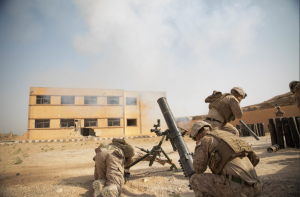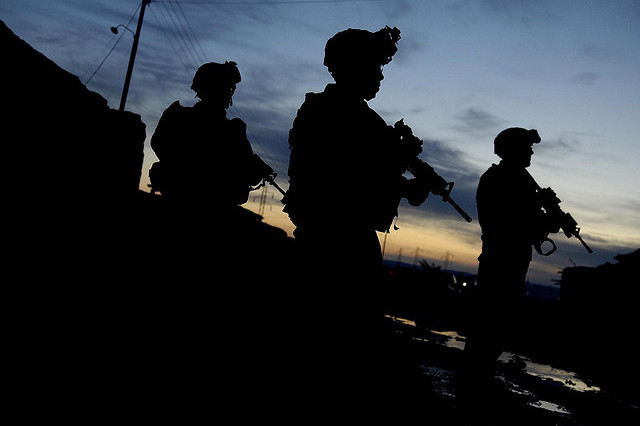Afghan President Hamid Karzai is in Washington this week attempting to mend fences with the Obama administration, but Fouad Ajami, for one, isn’t buying it. In an interview released yesterday on the National Review website, Ajami — the neoconservative-aligned Middle East scholar best known as one of the intellectual godfathers of the Iraq war — offered a startlingly pessimistic take on the war in Afghanistan. While Ajami’s claims largely reitereated those of other critics of the Afghan war, the source if nothing else makes them noteworthy.
Calling Karzai a “bandit” who “has no interest in assuming the burden of governing Afghanistan,” Ajami stated that the bleakly pessimistic November 2009 memo by U.S. ambassador Karl Eikenberry arguing against a troop surge was “completely on the mark”. He went on to argue that “the Afghanistan campaign can’t be won,” that “there’s nothing to be gained in Afghanistan,” and that the notion of Afghanistan as the “central front” in the war on terror is a myth.
“Look, I was a hawk on the Iraq war, and I didn’t question the Iraq war,” Ajami said. “I haven’t really written much on Afghanistan by way of criticism…but I have dark thoughts about Afghanistan and whether Afghanistan is worth American blood and American treasure.”
His interviewer, former Reagan speechwriter Peter Robinson, was clearly expecting something more upbeat and seemed taken aback by Ajami’s criticisms of the war. “Well, I didn’t expect you to be quite so grim about it,” Robinson muttered in response, before asking whether Ajami felt that the recent commitment of 30,000 additional troops to Afghanistan was worth it. Ajami didn’t answer the question directly, but clearly indicated a negative answer, concluding of the war that “it just doesn’t end well.”
Ajami’s blunt attack on the war is particularly interesting given his close connections to the neoconservatives who were the strongest advocates of the recent troop surge. Indeed, if one were to rank the Arabists with the greatest influence on neoconservative thinking about the Middle East, Ajami would likely be second only to Bernard Lewis. Does this influence mean that his criticisms will receive a respectful hearing on the right? Or will he receive the same treatment as previous right-wing critics of the war like George Will, whose September 2009 call for the U.S. to “get out of Afghanistan” brought forth a series of vicious attacks from the neocons alleging cowardice and appeasement? (Peter Wehner’s jab that Will’s column “could have been written in Japanese aboard the USS Missouri” was par for the course.) Perhaps the most likely outcome is that Ajami’s inconvenient criticisms will simply be ignored altogether.





Yeah, probably will be ignored altogether. Ajami is unknown to the American public (beyond viewers of PBS’ “Newshour”); his remarks will not carry beyond the journalistic and policy wonk communities.
The war will end badly, or lead nowhere, because there’s nothing to nation-build with (not that we’re great at nation-building anyway). I’m unclear to what extent the Afghan population as a whole is opposed to our presence — the “statistics” available are all over the place, indicating that no one really knows. It seems that support for the U.S. effort amongst Afghans varies according to ethnicity.
I think the administration is seeking a way to get out without being savaged politically from the right. Obama’s escalation was necessary not so much from a military perspective as from a domestic political one (including keeping the generals on board). Do we call that cynical? Playing with people’s lives? Depends on how you look at it. Eisenhower could have sold a cut-and-run policy, though with difficulty; Obama is no Eisenhower. Politics remains the art of the possible, even if you’re commander-in-chief (and especially if you’re a newbie, African-American one).
I forsee a draw-down beginning in 2011 and possibly some sort of negotiated settlement that gives the Taliban, or some of them, a share of power. Obama himself has said that we can’t afford to stay indefinitely. If the battlefield appears stalemated after 18 months of surge, the time will be ripe for our exit. To leave before then means getting sliced-and-diced politically here at home.
In the meantime, as much damage as possible should be done to the Pakistani Taliban. Once Pakistan sees we are leaving, they will let up on the latter and seek a new accomodation with them. That could conceivably start the pre-9/11 cycle all over again.
The fact is, our policy toward the Islamic world has been flawed since the days of Truman. Even if Obama gets us out of Afghanistan, we will still be living with the problems created way back in ’48, ’53, and after.
“…as much damage as possible should be done to the Pakistani Taliban.” I agree with everything you wrote save this paragraph. What you advocate in the citation above IS what will cause another 9/11.
Jon, go back to the article from the Iranian journalist. Our inflicting hardship on people results in blowback. Hitting them hard will only ensure they settle the score.
Seriously, I never met so many chicken shit talkers. I played rugby for a dozen years. I played nasty games and nice ones. Wise men play nice games. Not that I’m above a dirty move. But this is real with real physical consequences.
Not many Americans play contact sports with reciprocity. We don’t fight wars where there is any balance. All I know is, you pull a cheap shot, someone will rake your skull when you’re on the turf. I seriously think few people have this very real education, especially policy makers and academics who are so insulated they think their poop don’t smell, so we shouldn’t be offended when they give us the dirty Sanchez.